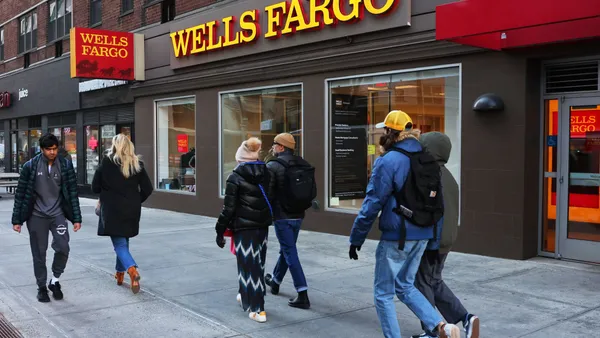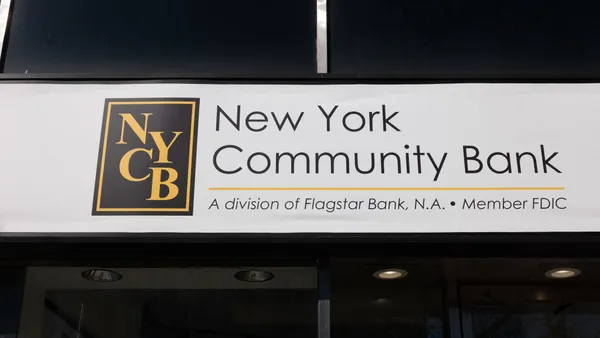As tensions between the U.S. and Iran reach new heights, the U.S. banking industry should anticipate more regulatory scrutiny in anti-money laundering, said Everett Stern, a former corporate whistleblower whose work with CIA investigators uncovered HSBC's international money laundering activities in 2012.
In response to the U.S.'s targeted killing of Iranian Major General Qassem Soleimani on Jan. 3, Iran launched missiles at two military bases housing U.S. troops in Iraq the following week. No deaths were reported.
The Trump administration then levied a new round of economic sanctions against Iran, targeting the Islamic Republic's construction, manufacturing, textiles and mining sectors.
"The level of anti-money laundering tightening and the laws that are about to come out of this, I guarantee you, are going to be unreal," Stern told Banking Dive.
Stern's actions as a whistleblower at HSBC resulted in the London-based bank shelling out a record $1.9 billion fine for allowing itself to be used to launder drug money and violating sanctions law by doing business with customers in Iran, Libya, Sudan, Myanmar and Cuba.
Lawrence Ward, a partner at Dorsey & Whitney who works on global trade issues, said Trump's latest round of sanctions appears to apply the most pressure on foreign financial institutions in the hope that they will voluntarily cut off access to all individuals and entities in various sectors of the Iranian economy.
"Foreign financial institutions risk having their own U.S. correspondent accounts shut off if they facilitate any transaction with targeted individuals and entities in these sectors," he told Banking Dive.
The sanctions could also create a "compliance headache" for foreign and U.S. banks, said Ward, a former appointed member of the State Department's Defense Trade Advisory Group.
"Certain activities with Iran, such as humanitarian donations, largely will continue to be allowed, but such activities will not be allowed with respect to individuals and entities targeted under these new sanctions," he said. "Whether or not these sanctions will have their intended impact will, of course, depend on the U.S. government actually and strategically using them to target certain individuals and entities. And, even more importantly, will depend on foreign financial institutions taking them seriously and restricting access to targeted Iranian companies."
Stepping up efforts
The Treasury Department's Financial Crimes Enforcement Network (FinCEN) has already designated Iran as a primary money laundering concern. Section 311 of the USA Patriot Act, which went into effect Nov. 4, prohibits U.S. financial institutions from opening or maintaining a correspondent account on behalf of an Iranian financial institution. The rule also prohibits U.S. financial institutions from processing transactions involving Iranian banks.
The agency also created a Global Investigations Division in August, meaning U.S. financial institutions may be required to provide more customer information to FinCEN, according to The Wall Street Journal.
Former officials told the Journal the new stand-alone office highlights one of FinCEN's key priorities in 2020.
Steven Beattie, global financial crimes and operations leader at Ernst & Young, called the division "another tool in the arsenal," adding that, in recent years, financial regulators and enforcement agencies have relied more heavily on banks to spot criminals.
As was the case with HSBC, banks haven't always been forthcoming with their ties to money laundering or terrorist financing.
The whistleblower
Stern, who worked at HSBC as an anti-money laundering compliance officer in 2010 and 2011, first noticed that HSBC employees and senior management were manipulating wire filters to allow payments to flow to and from sanctioned parties or countries.
"[They] were putting in dots and dashes in the payment, so the payments wouldn't match and the wires would go through," he said.
After multiple alerts to supervisors were dismissed, Stern turned to the CIA, feeding the agency information for more than a year before leaving the bank in November 2011.
"HSBC was intentionally trying to get money to terrorists and drug cartels. That was the name of the game. And they were making a lot of money doing this," he said.
After a federal probe, HSBC entered into a deferred prosecution agreement with the Department of Justice at the end of 2012, and agreed to forfeit $1.256 billion and retain a compliance monitor.
As part of the settlement, the bank acknowledged it failed to maintain an effective program against money laundering and failed to conduct basic due diligence on some of its account holders.
For the violations, HSBC also agreed to pay $665 million in civil penalties — $500 million to the Office of the Comptroller of the Currency (OCC) and $165 million to the Federal Reserve.
But despite the record fine and public acknowledgment of wrongdoing, Stern said, "the real mission was not accomplished, which was to get people in jail."
The bank's $1.9 billion fine equates to five weeks' profit, Stern said. No HSBC employees were charged.
"These banks are being fined, but they make so much money, it doesn't matter to them. It’s the cost of doing business," said Stern, who now operates his own private intelligence agency, Tactical Rabbit, which he founded in 2012.
Federal authorities acknowledged in a press conference announcing the settlement that they chose not to indict HSBC over concerns that criminal charges could jeopardize the global systemically important bank.
"Had the U.S. authorities decided to press criminal charges, HSBC would almost certainly have lost its banking license in the U.S., the future of the institution would have been under threat, and the entire banking system would have been destabilized,” Assistant Attorney General Lanny Breuer said.
Attempts to hold HSBC and other global banks accountable for the loss of life and dismemberment of U.S. soldiers attacked by weapons linked to terrorists have also faced hurdles.
Several lawsuits that would hold global banks liable for enabling militants to conduct attacks against U.S. forces in Iraq by allegedly providing banking services to Iran have been dismissed in recent years.
Judge Pamela Chen of the U.S. District Court for the Eastern District of New York said in a September ruling that providing material support to foreign governments accused of sponsoring terrorism is not actionable under the Financial Anti-Terrorism Act. Plaintiffs need to show proof that the defendants knew their actions would support terrorism, she said.
AML legislation
Anti-money laundering reform has been on the minds of several legislators this past year.
The House passed the Cooperate with Law Enforcement Agencies and Watch Act of 2019 (H.R. 758) in March. The bill aims to "strengthen cooperation between financial institutions and law enforcement agencies to better detect, deter, and combat terrorism and financial crimes." It would create a safe harbor for banks that keep customer accounts open at law enforcement's request.
Another anti-money laundering bill, the Corporate Transparency Act (H.R. 2513), would crack down on the illicit use of anonymous shell companies. It has been backed by banks and industry trade groups.
The bill would require companies that have characteristics of a shell corporation to disclose their true beneficial owners to FinCEN at the time the company is formed.
Rep. Carolyn Maloney, D-NY, who introduced the bill in May, said it would also streamline compliance costs for financial institutions.











